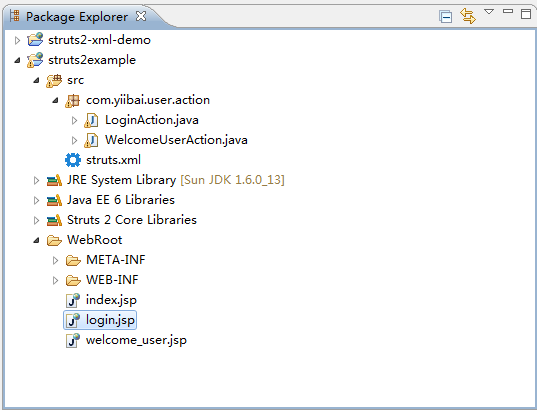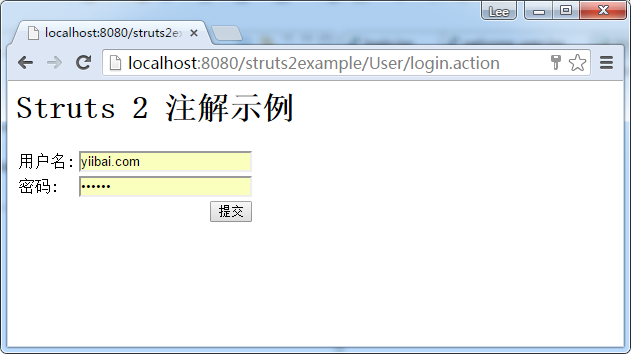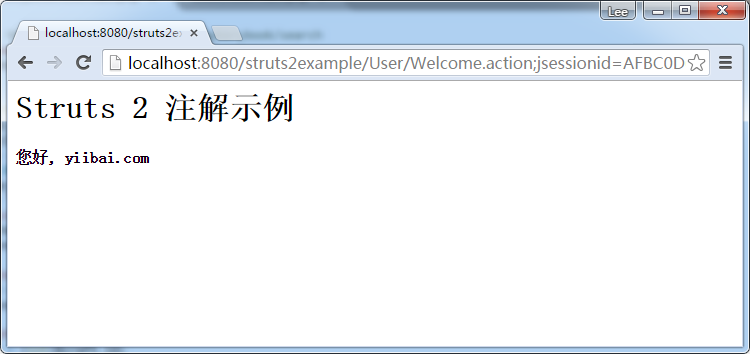Struts2注解示例
在這個教學,我們重複使用以前 STRUST2 Hello World(XML版本)的例子,並將其轉換成注解版本。
Struts2 注解概念
Struts2注解是由Struts 2的約定插件的支持,所以,必須要了解其背後的“掃描方法”和“命名轉換”機製的魔力。
1. 掃描方法
許多Struts 2的文章或書籍說,可以配置過濾器的“init-param”或“struts.convention.action.packages”告訴Struts2,其中掃描注解的類。 例如,
web.xml
<filter> <filter-name>struts2</filter-name> <filter-class>org.apache.struts2.dispatcher.FilterDispatcher</filter-class> <init-param> <param-name>actionPackages</param-name> <param-value>com.gitbook.netmon</param-value> </init-param> </filter>
從測試(Struts22.1.6和2.1.8版本),這是不正確的,不管你把在“param-value”還是 “struts.convention.action.packages“, 在Struts 2會忽略它,並隻掃描指定的文件夾命名:struts, struts2, action 或 actions 。
下麵是掃描工作
- 掃描其位於包的命名注解的類 “struts, struts2, action 或 actions“.
-
接著,掃描相匹配下列任一條件的文件:
- 實例了 com.opensymphony.xwork2.Action 接口。
- 擴展了 com.opensymphony.xwork2.ActionSupport 類
-
文件名用動作(例如:UserAction,LoginAction)結束
詳細請查看這裡Struts 2 約定插件文件
2. 命名轉換器
Struts 2的約定插件將所有的注解操作文件名轉換為指定的格式。
例如 : LoginAction.java
-
首先,去掉“Action”字符在文件名的末尾,如果存在的話。
-
其次,轉換文件名的第一個字母為小寫。
因此,去除結束並轉換第一個字母為小寫後,LoginAction.action 將變為 login.action。
Struts2約定插件的“掃描方法”和“命名轉換”特性真正帶來了很多的便利和好處,隻有當你的Struts2項目正確下麵的命名約定才會帶來好處; 否則,這將是一場災難。
Struts 2 注解例子
現在是時候開始轉換過程了,我們使用MyEclipse 10 創建一個工程為:struts2example。
最終的項目結構

2. LoginAction
擴展ActionSupport並創建了LoginAction,什麼也不做,ActionSupport 默認返回 “success” 字符串,這將匹配 @Result 並重定位到 “pages/login.jsp“.
注解版本
package com.yiibai.user.action;
import org.apache.struts2.convention.annotation.Namespace;
import org.apache.struts2.convention.annotation.Result;
import org.apache.struts2.convention.annotation.ResultPath;
import com.opensymphony.xwork2.ActionSupport;
@Namespace("/User")
@ResultPath(value="/")
@Result(name="success",location="/login.jsp")
public class LoginAction extends ActionSupport{
}
XML 實現版本
<package name="user" namespace="/User" extends="struts-default"> <action name="Login"> <result>/login.jsp</result> </action> </package>
3. WelcomeUserAction
重寫execute()方法並指定 @Action 和 @Result 注解。
注解版本
package com.yiibai.user.action;
import org.apache.struts2.convention.annotation.Action;
import org.apache.struts2.convention.annotation.Namespace;
import org.apache.struts2.convention.annotation.Result;
import org.apache.struts2.convention.annotation.ResultPath;
import com.opensymphony.xwork2.ActionSupport;
@Namespace("/User")
@ResultPath(value="/")
public class WelcomeUserAction extends ActionSupport{
private String username;
public String getUsername() {
return username;
}
public void setUsername(String username) {
this.username = username;
}
@Action(value="Welcome", results={
@Result(name="success",location="welcome_user.jsp")
})
public String execute() {
return SUCCESS;
}
}
XML 實現版本
<package name="user" namespace="/User" extends="struts-default"> <action name="Welcome" class="com.yiibai.user.action.WelcomeUserAction"> <result name="SUCCESS">/welcome_user.jsp</result> </action> </package>
Struts 2 注解 – @Action, @Result 和 @Namespace 不言自明,可以將它與XML比較。@ResultPath 可能需要一點點的解釋,請參閱本 @ResultPath示例
4. JSP視圖頁麵
普通JSP視圖頁麵來接受用戶名和密碼後點擊提交按鈕,並重定向到一個歡迎頁麵。
login.jsp
<%@ page contentType="text/html; charset=UTF-8"%> <%@ taglib prefix="s" uri="/struts-tags"%> <html> <head></head> <body> <h1>Struts 2 注解示例</h1> <s:form action="Welcome"> <s:textfield name="username" label="用戶名" /> <s:password name="password" label="密碼" /> <s:submit value="提交"/> </s:form> </body> </html>
welcome_user.jsp
<%@ page contentType="text/html; charset=UTF-8" %> <%@ taglib prefix="s" uri="/struts-tags" %> <html> <head></head> <body> <h1>Struts 2 注解示例</h1> <h4>您好, <s:property value="username"/></h4> </body> </html>
5. struts.xml
所有類注解無需創建 struts.xml 文件。
6. web.xml
隻要創建一個典型的web.xml文件,並聲明FilterDispatcher過濾器標準。
<!DOCTYPE web-app PUBLIC "-//Sun Microsystems, Inc.//DTD Web Application 2.3//EN" "http://java.sun.com/dtd/web-app_2_3.dtd" > <web-app> <display-name>Struts 2 Web Application</display-name> <filter> <filter-name>struts2</filter-name> <filter-class>org.apache.struts2.dispatcher.FilterDispatcher</filter-class> </filter> <filter-mapping> <filter-name>struts2</filter-name> <url-pattern>/*</url-pattern> </filter-mapping> </web-app>
7. 運行測試
LoginAction.action 改為 login.action,請參閱上麵的“命名轉換器”。
http://localhost:8080/struts2example/User/login.action


提交到 http://localhost:8080/Struts2Example/User/Welcome.action 後顯示:



